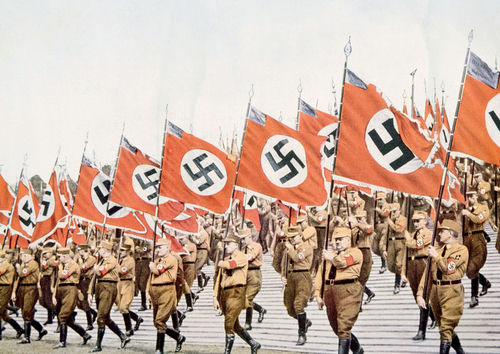Germany’s alarming return to Nazi-era tactics—banning Jews from businesses—should serve as a wake-up call to anyone who values freedom and constitutional rights.
Antisemitic Sign in Flensburg Sparks National Outrage
On September 17, 2025, a shopkeeper in Flensburg, Germany, placed a sign in his window that read “Jews not allowed,” with the added message, “Nothing personal, nothing antisemitic – I just can’t stand you.” The incident quickly drew national attention for its direct reference to Nazi-era exclusion tactics that once targeted Jews, a chilling echo of Germany’s darkest history. The shop owner, who sells Gothic and secondhand books, claimed this was a protest against Israeli actions in Gaza, denying charges of antisemitism even as the sign remained visible inside the store. Police responded, but the sign was not immediately removed, prompting a wave of condemnation and legal action from both local officials and national authorities.
Public figures wasted no time denouncing the act. Felix Klein, Germany’s Federal Commissioner for Jewish Life, declared it a “very clear case of antisemitism” and demanded swift action. Flensburg’s mayor, Fabian Geyer, called the sign a “reminder of the darkest chapters of Germany’s history.” Israeli Ambassador Ron Prosor went further, warning that “the 1930s are back… politicians must act now, before words turn into deeds again.” Their unified condemnation highlighted the gravity of the incident and the need for vigilance as historical patterns of hate threaten to re-emerge. Community leaders and former officials filed legal complaints, ensuring the case would be investigated for incitement to hatred and disturbing public peace.
Historical Parallels and the Dangers of Normalizing Hate
Germany’s history with antisemitism is tragic and well-documented, culminating in the Holocaust and the systematic exclusion of Jews from public life. The use of overtly discriminatory signs in businesses was common in the 1930s and 1940s, and their reappearance today signals a dangerous erosion of social norms that protect minority rights. Experts and educators have emphasized the importance of remembering this legacy, warning that normalizing hate speech—even under the guise of political protest—sets a precedent that endangers all constitutional protections. The Flensburg incident has reignited debate about the limits of free speech, the responsibilities of retailers, and the necessity of defending traditional values against radical agendas.
While the shop owner insists his actions were political, not racist, officials and most commentators have firmly rejected this defense. The explicit targeting of Jews, regardless of the justification, is seen as a direct violation of both Germany’s laws and the foundational principles of Western democracy. The swift response from leaders and the public reflects an understanding that allowing such displays to go unchallenged risks emboldening extremists and undermining decades of progress. This is a lesson for Americans as well—when hate is tolerated, constitutional freedoms and family values are put at risk.
Legal Response and Broader Implications for Freedom
Legal proceedings are currently underway in Flensburg, with police and prosecutors investigating the shop owner for incitement to hatred and disturbing public peace. The incident has damaged the city’s reputation as an open and tolerant community, strained inter-community relations, and put political pressure on authorities to strengthen anti-hate measures. For Germany and the broader Western world, the event serves as a stark reminder that constitutional rights require active defense against those who seek to erode them—whether through discriminatory signs or government overreach.
'Jews not allowed, can't stand you': Antisemitic sign at German store sparks outrage: 'Jews not allowed, can't stand you': Antisemitic sign at German store sparks outrage
Shop owner in Flensburg under fire after posting sign banning Jews from his store; officials and residents…— Steve Williams (@HISteveWilliams) September 19, 2025
Retailers now face increased scrutiny, and society is forced to confront the tension between freedom of expression and hate speech. The Jewish community and allies have become more vigilant, concerned not only for their safety but also for the visibility of minority groups in Europe. As debates continue, conservative Americans watching from abroad should remember that the fight to preserve family values, individual liberty, and constitutional protections is never truly over. When political protest becomes a cover for bigotry, it is up to principled citizens and leaders to draw a clear line in the sand.
Sources:
German shop posts sign: No entry for Jews
German shop sign barring Jews draws condemnation, legal complaints
Antisemitic sign at German store sparks outrage, recalls Nazi era

